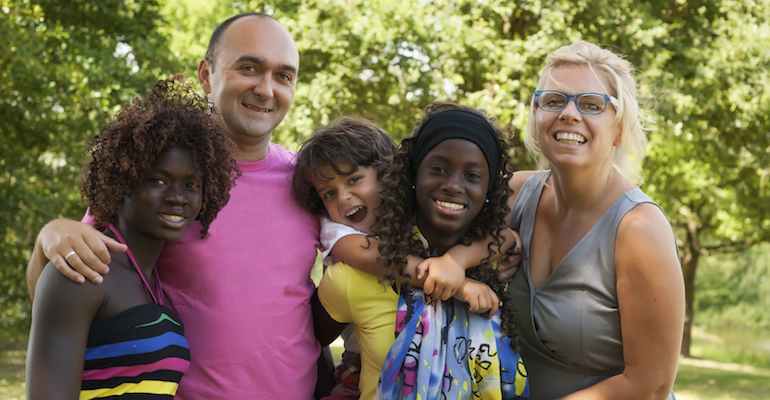The summer before I turned eight, my adoptive family and I flew to the Midwest to attend an extended family reunion. As I stood among a sea of unfamiliar faces, I noticed that I could easily pick out my parents’ brothers and sisters, and could figure out which cousins belonged with which aunt or uncle. They all looked so much alike! Standing there — feeling remarkably different — I wondered to myself: If families are people who resemble each other, how did I fit in?
Just Like Mom and Dad
Children have a strong need to fit in, to belong, and they look to their families first to fulfill that need. By ages six to eight, kids are developing a sense of self, and are becoming aware of how they are physically different from — or similar to — their parents. Children of this age are also developing reasoning skills, so they may ask, “If you have red hair, and Grandma has red hair, will I have red hair when I grow up?” or “If Mom is white, and you are white, what am I?”
An adoptee looks for matching physical traits to identify with her parents. A girl of six or seven may say, “Look, Mom. We both have brown hair and brown eyes!” As she points out similarities, she’s sorting out what it means to be a family, and saying, “We’re connected, right?”
In some cases, however, the situation is more complex. If a family consists of biological and adopted children, an adoptee may, at times, feel sad or jealous because she doesn’t look like everyone else. (This is normal.) Or if a child is adopted transracially or from another country, others may point out her physical differences.
Whatever the situation, a parent’s job is to be sensitive to a child’s questions and concerns, and discuss such matters honestly. If your eight-year-old tells you she doesn’t fit in because she doesn’t resemble her brother, you can say, “You may not look alike, but you’re still very much a part of our family.” Then teach her to express her feelings in an honest, nonaggressive way. If your son asks, “Will I be tall, like my birth father, when I grow up?” you can say, “I don’t know. But I can see why you’re interested.” Validating your child’s questions — and his curiosity — is powerful and can open the door for further discussions.


